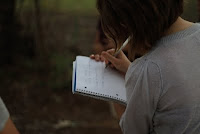How to write all the time – Part 1
 Writing a novel takes time, and if you hope to ever write more than one polished opening section, you have to find the time to do it. Trouble is, Real Life has a habit of getting in the way. We already know that writing isn't just about putting words on paper, and if you're serious about your work, sacrifices have to be made – but still – wouldn't it be great if we could write all the time?
Writing a novel takes time, and if you hope to ever write more than one polished opening section, you have to find the time to do it. Trouble is, Real Life has a habit of getting in the way. We already know that writing isn't just about putting words on paper, and if you're serious about your work, sacrifices have to be made – but still – wouldn't it be great if we could write all the time? The fact is, you can, even when you're asleep, and here's how.
You can distil the creative process down to two things: observation and invention, and when you look at it like that, it's hard to imagine a situation where a writer cannot exercise these two core skills – daydreaming, listening, watching – can be done at any time. The trick is, capturing these observations and thoughts when you really haven't got the time or should be doing something else entirely. Every writer should keep a notebook, and this is the time to use it – but what do you do when you haven't even got time or hands free to jot some notes down?
Dictaphone
Once an indispensable tool for writers/journos/secretaries the world over - it's time to reconsider this trusty device. Not only great for whipping out and capturing thoughts verbally, it's also good to record yourself reading your MS. It may feel weird articulating observations and ideas without the luxury of immediate re-editing via a keyboard, but it will encourage the construction of immediately coherent sentences as well as capturing content, so you'll be developing style and voice too. Many come with a microphone that can be discretely clipped to clothing so no-one even has to know that you're not just talking to yourself.
Camera
In the same way that the Impressionists were influenced by the advent of photography, forcing yourself to record details using a camera will make you see the world in a different way – capturing scenes, land or city scapes or just powerful images that move or provoke you - and the interesting side-effect of this is that you may see something in the pictures later that you didn't see at the time. You can also use them as prompts for short-stories. A picture can be taken in a fraction of a second, and perused at leisure later – so there is every reason to add this string to your writerly bow.
Mobile Phones
Most mobile phones have both vocal record functions and cameras, and even note-making facilities – so we have even less of an excuse not to exploit these methods of recording ideas and observations when we're away from our keyboards. What's particularly good about a mobile phone is that it's not going to look odd or even unprofessional to use one - you can take photos discretely, use the handsfree set to record your observations, and even if your phone doesn't have a record function or a camera, you can phone your voicemail and leave yourself a message if you have that earth-shattering idea that you really need to record whilst waiting in line at the water cooler.
Essentially, it's all about training yourself to take every opportunity to augment your writing.
Part 2 of this post will discuss further techniques for writing when at work, driving a car, or even asleep, amongst other things.
Anybody else got any other good ideas for writing when writing isn't really an option?


Those are good ones! I've been known to jot a note in the notes section of my iPod touch and e-mail it to myself. The key is making sure that e-mail gets put with my manuscript notes!
ReplyDeleteSometimes when I'm doing boring chores I try to solve plot riddles that are bothering me. But it's important to have a pen handy, just in case inspiration strikes!
A phone tip similar to what Portia writes.
ReplyDeleteIf I'm out and have spare time I'll browse my Google Reader or Twitter on my cell phone (I own a Palm Pre, which apparently means I'm some sort of idiot). When I find an article or blog post that interests me but I don't have time to digest I send it to myself.
Back at my computer I tag it and read it properly over coffee or during lunch. It's not exactly writing, but is a way I've managed to hold on to ideas I'd have otherwise lost.
I enjoyed your post; looking forward to part 2.
@Portia - yes, I'm going to upgrade to a slightly smarter phone so I can do just that and what Paulo suggests more easily - yes, it's good to force yourself to think plot ideas out while doing mundane stuff - the art of day-dreaming.
ReplyDelete@Paulo - this reminds me of one of my favourite posts of yours that I've just dug out because I think it's worth posting here, as I'm sure people who read this will find it relevent and interesting http://www.yingleyangle.com/2010/03/5-writing-activities-you-can-accomplish.html
Greetings: I've been enjoying a good read of your posts. This one could be a companion to my 'writing at the dentist' post. As soon as I got in the car I used my iPhone to email the ideas to myself.
ReplyDeleteI like your idea of thinking 'photo shots' as a writing tool.
Thanks, Rahma - this is exactly why your post resonated with me. In truth, all the posts I've read on your blog have been excellent. You can count me as a fan.
ReplyDelete